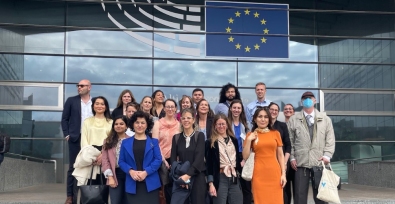In a decisive step towards cleaning up supply-chains, the European Union has approved a law forbidding the sale of products made with forced labor. As reported by Human Rights Watch (HRW), the law will help combat labor abuse and hold companies to account.
Big profits that lead to a big problem
According to the ILO Forced Labour Convention, 1930 (No. 29), forced labor is “all work or service which is exacted from any person under the threat of a penalty and for which the person has not offered himself or herself voluntarily”. And it’s easy to understand why companies have taken advantage of forced labor in places like the Uyghur region, Türkiye and Russia. Obviously, forced labor keeps production costs low, which in turn leads to more profits for the company. A recent ILO report cited profits from forced labor in the private sector at around US$63.9 billion annually. That figure points to the scale of the issue of modern slavery.
Human Rights Watch said:
“The 2022 ILO Global Estimates on Modern Slavery estimated that 17.3 million people are victims of forced labor exploitation in the private sector worldwide; an 8 percent increase between 2016 and 2021.”
Additionally another 3.9 million are working under state-imposed forced labor. That means national or local authorities are forcing citizens to work in places like the Uyghur region, Turkmenistan and North Korea. But the new Forced Labor Regulation (FLR) requires trade authorities across the EU to prevent anything made in part or in whole with forced labor from entering their markets. Companies will have to ensure no part, product or material was made/harvested using forced labor.
New rules need a new approach
The EU Corporate Sustainability Due Diligence Directive already required big companies to conduct due diligence of their supply chain. From start to finish companies must identify, prevent, mitigate, and remedy environmental damages and human rights abuses. And with the new law, companies will also need to ensure forced labor is eliminated from their supply chains. But none of this works without effective enforcement. EU and member states will need to significantly step up their investigative efforts and eliminate any aspect of their products made with forced labor.
Human Rights Watch identified an important first step, stating:
“The Commission should begin by identifying Xinjiang, Turkmenistan, and North Korea as high-risk countries or regions experiencing state-imposed forced labor in a new forced labor risk database, mandated by the legislation. That will make it easier for investigators to target products tainted by forced labor and lay the ground for a systemic change.”
Promising to “rebalance” ties with China the EU’s Commissioner-designate for Trade, Maroš Šefčovič has said the EU would be “more assertive in challenging structural imbalances and unfair practices” including “non-market policies driving overcapacity” going forward. Further, HRW states the next European Commission needs to empower the new law. The FLR could enable the EU to legally tackle the scourge of modern slavery and expunge it from their markets. And by eliminating the unfair business advantage forced labor gives to all industries, it eliminates it as a profitable practice and will help end forced labor for good.







Freedom United is interested in hearing from our community and welcomes relevant, informed comments, advice, and insights that advance the conversation around our campaigns and advocacy. We value inclusivity and respect within our community. To be approved, your comments should be civil.
Thank you for the work you are doing.
Great news! Long overdue. Let’s hope it makes a real change on the ground for victims of forced labour worldwide.